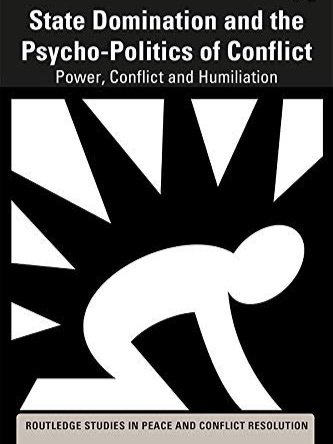Books
In his most recent book, State Domination and the Psycho-Politics of Conflict, Rothbart examines the source of conflicts in the destructive power of governmental forces to manipulate the minds of low-power groups for purposes of systemic control.
-

State Domination and the Psycho-Politics of Conflict: Power, Conflict and Humiliation
ROUTLEDGE PRESS, 2019
In many conflict settings, a nation’s government exerts its dominance over a marginalized population group through laws, policies, and practices that foster stark inequality. This book shows how such domination comes in the form of systems of humiliation orchestrated by governmental forces.
-

Systemic Humiliation in America: Finding Dignity within Systems of Degradation
PALGRAVE MACMILLAN, 2018
Contemporary social conflict and violence occur when powerful institutions seek to manipulate the thoughts of marginalized people—manufacturing their feelings and fostering a sense of inferiority—for disciplinary control. This book reveals how certain countermeasures, based on a commitment to human dignity and respect for every person’s inherent moral worth, can combat this violence.
-

Violent Conflict and Peacebuilding: The Continuing Crisis in Darfur
ROUTLEDGE PRESS, 2013
While violence in the Darfur region of Sudan continues, Darfurians are engulfed in the tumult, experiencing systematic slaughter, sexual violence, and internal displacement on a massive scale. This book examines the continuing devastation in the region from the perspective of a multiplicity of conflicts of distinct types.
-

Civilians and Modern War: Armed Conflict and the Ideology of Violence
ROUTLEDGE PRESS, 2012
Underpinning the physicality of war’s tumult are structural forces that create landscapes of civilian vulnerability. Such forces operate in four sectors of modern warfare: nationalistic ideology, state-sponsored militaries, global media, and international institutions. This book explores the issue of civilian devastation in modern warfare, focusing on the complex processes that effectively establish civilians’ identity in times of war.
-

Why They Die: Civilian Devastation in Violent Conflict
UNIVERSITY OF MICHIGAN PRESS, 2011
During a conflict, all those on the opposite side are perceived as the enemy, with little distinction between soldiers and civilians. As a result, random atrocities and systematic violence against civilian populations become acceptable. This book systematically studies civilian devastation in violent conflicts and investigates the identity politics underlying conflicts of many types.
-

Philosophical Instruments: Minds and Tools at Work
UNIVERSITY OF ILLINOIS PRESS, 2007
Just as a new spear can change a hunter’s knowledge of the environment, so can the development of modern scientific equipment alter our view of the world. Working at the intersections of science, technology, and philosophy, this book examines the revolution in knowledge brought on by recent advances in scientific instruments.
-

Identity, Morality, and Threat: Studies in Violent Conflict
LEXINGTON BOOKS, 2006
This book offers a critical examination of the social psychological processes that generate outgroup devaluation and ingroup glorification as the source of conflict. The authors bring together essays analyzing the causal relationship between escalating violence and opposing images of the Self and Other.
-

Modeling: Gateway to the Unknown, A Work by Rom Harré
ELSEVIER SCIENCE B.V. 2004
Edited by Rothbart, this book is a collection of Rom Harré's work on modeling in science, particularly physics and psychology. Studies in Multidisciplinarity include major topics on the structure and function of models, the debates over scientific realism, explanation through analogical modeling, a metaphysics for physics, the rationale for experimentation, and modeling in social encounters.
-

Explaining the Growth of Scientific Knowledge: Metaphors, Models and Meanings
MELLEN PRESS, 1997
This study explains scientific progress through analogical cross-fertilization of ideas between distinct physical systems. In many cases, progress can be generated from a radically new juxtaposition of apparently incongruous physical systems, producing original horizons of intellectual vision.
-

Science, Reason and Reality: Issues in the Philosophy of Science
HARCOURT/BRACE, 1997
PEKING UNIVERSITY PRESS, 1997Highlighting the work of the most prominent and influential scholars in the field, the articles reflect a diversity of philosophical opinions and demonstrate to students how each position is subject to constructive criticism and how this criticism motivates alternative positions.